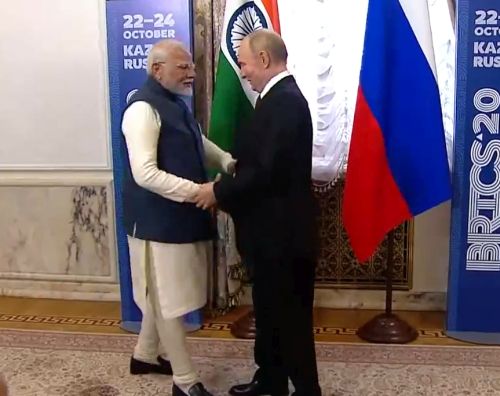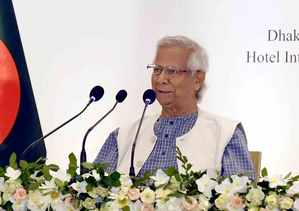International
The Third Eye: A new Cold War with a difference
New Delhi: The Middle East is in a situation of flux because of the recent exchange of drone and missile attacks between Iran and Israel, an important visit to Pakistan made by the Iranian President following these events, and the fallout of Israel-Hamas conflict that produced pro-Palestinian demonstrations in the US and elsewhere in the Muslim world.
This is opening up the question as to what impact are the religious divides in the region making on the ideologically delineated Cold War that was already on the horizon involving the US-led West on one hand and the China-Russia axis, on the other.
The old political rivalry between the two strong players in the region, Israel and Iran, took a violent turn when Israel — opposed to the rule of Bashar Al Assad, the Alawite President of Syria — made a missile attack on Damascus on April 1 in which Iran’s diplomatic mission was hit and seven officers of the Islamic Revolutionary Guards Corp were killed.
Iran retaliated on April 13 by firing missiles at Israel that were mostly shot down by the Iron Dome Defence system of the latter and a few days later on April 18 Israel responded by making a drone attack on Isfahan that reportedly did not cause any significant casualties.
There was an element of restraint on both sides which stemmed from a combination of factors — Iran weighing in the US support for Israel and Israel sensing the limitations on American backing put by the international criticism of the loss of civilian lives in Gaza at the hands of Israeli Defence Forces.
In fact, in the Joe Biden administration, the White House was contemplating measures to balance its support to Israel with an effort to counter any Islamophobic trends that the Israel-Hamas conflict could produce following the October 7 ‘terror’ attack of Hamas on Israel. The US is also at the same time, having to deal with pro-Palestinian demonstrations held in the country, particularly on the university campuses there.
Iran and Pakistan, the two neighbouring Islamic countries — though inherently prone to the repercussions of the historical Shia-Sunni divide, have maintained a cautious line of peaceful relationship that could even overcome the incidents of exchange of missile attacks between them in January this year.
The Sunni Islamic radical outfit Jaish Al Adl based in Baluchistan intruded into the adjoining Sistan area of Iran whereupon Iran fired missiles on the outfit’s base in Baluchistan — inviting in return, a retaliatory military strike from Pakistan that seemed somewhat symbolic.
In the background of the Israel-Hamas conflict, Iran was getting politically drawn to the China-Russia combine — it had already extended military help to Russia by way of supply of drones to the latter during the Ukraine-Russia ‘war’.
Pakistan on its part, has historically been opposed to the creation of a Zionist state and maintains no diplomatic relations with Israel even today.
Pakistan has a strong strategic alliance with China but has managed to be on the right side of the US after playing the role of a mediator in the talks between the Taliban and the US at Doha that resulted in the withdrawal of American troops from Afghanistan and the reinstallation of the Taliban Emirate at Kabul in 2021.
Pakistan is also a key member of the Organisation of Islamic Conference (OIC) and has been extremely close to Saudi Arabia, the Chairman of this block of 57 Islamic countries.
Sunni radicals consider the US and the Shiites as their enemies and would abhor the idea of Pakistan getting close to the US. Pakistan, however, has struck an equation with radical outfits like the Taliban, Al Qaeda and the Islamic State of Iraq and Syria (ISIS) which are inimical to the US, Saudi Arabia and the Ayatollah regime of Iran, alike.
For Iran, friendship with Pakistan is strategically gainful for maintaining its hold in the Middle East against its main rival Israel — it is aware that left to itself Pakistan did not harbour any faith-based antipathy towards Iran.
The three-day visit of Iranian President Ebrahim Raisi to Islamabad from April 22 in the context of the Israel-Hamas conflict — particularly after the exchange of missile attacks between Iran and Israel — is of great significance not only for the Middle East but also for the wider geopolitics that is marked by a clear drift towards a new Cold War between the US-led West and the China-Russia axis.
It is interesting how this political polarisation at the global level is getting bolstered by the religion-based alignments within the Muslim world in general and the Middle East in particular.
Iranian President clearly wanted Pakistan’s support in its confrontation with Israel even as both Iran and Pakistan were aware of the US opposition to any trade pacts between them.
The prolonged military action of Israel in Gaza has revived the fundamental antagonism between the Zionist state and Islamic Palestine.
The anti-US character of Shia fundamentalism and the pro-Assad stand of Iran in Syria have pushed Iran closer to Russia and China.
It is interesting, however, that radicalisation in the Islamic world is a cause for concern for both the US and Russia.
The US hopefully would have learnt the lesson that for political convenience in the past — in the context of the American banking on Pakistan for dealing with post-Soviet Afghanistan — it had made a strange attempt to draw a distinction between ‘good terrorists’ and ‘bad terrorists’ which had only added to the threat of faith-based terror from radicalised forces facing the world.
The US had tried to distinguish between Islamic radical outfits that considered it as their prime enemy and the terrorist groups reared and directed by Pak ISI for use in cross-border terrorism against India but it perhaps realised in the course of time that Pakistan was in fact also giving shelter to Taliban, Al Qaeda and ISIS on its soil.
President Biden’s White House is now concerned over the fallout of Israeli action in Gaza that had killed more than 30000 civilians in Palestine — pro-Muslim demonstrations in the US and outside might be weakening the US position in the Middle East and conferring a certain advantage to Russia and China there.
The US has to understand that multi-prong measures were needed to isolate the ‘radicalised’ forces by convincing the Islamic world that recourse to Jehad was not needed for solving any political issues. This is a challenge requiring the US and India to closely work together.
The injection of religion into international politics and the advent of faith-based violence in many theatres are posing a great danger to the democratic world order.
The identification of Israel with the US has accentuated the hostility of radical Sunni forces and the Shiite fundamentalists both, against the former. The position of pro-US Arab countries like Saudi Arabia and Egypt could get weakened if the military action of Israel in Gaza was further escalated leading to the destruction of civilian lives there.
India has taken an independent stand both in the Ukraine-Russia military confrontation and the Israel-Hamas conflict, favouring peaceful negotiations that would show an understanding of the security concerns of both Ukraine and Russia and in the case of Palestine uphold a two-state solution.
In the Middle East, advocates of Jehad pushed ‘revivalism’ to the point of stirring up the historical memory of Kharijites and have carried Shia-Sunni strife to a new level. They should be shunned and those who convincingly worked to establish Islam as a peaceful religion in the region, given discreet support.
While India would stand for all of that, its concern is that Pakistan would independently promote a narrative in the name of peace that there should be a resumption of Indo-Pak talks.
India has to take due notice of the fact that during the visit of Pak Prime Minister Shehbaz Sharif to meet Saudi ruler Prince Mohammad bin Salman, their joint statement issued at Mecca on April 7 last, stressed the importance of dialogue between Pakistan and India to resolve their outstanding issues especially the J&K dispute ‘to ensure peace and stability in the region’.
Also, on the recent visit of Iran’s President to Islamabad, a more elaborate joint statement issued on the occasion expressed that there was a need to resolve the issue of Kashmir through dialogue and peaceful means “based on the will of the people of that region and in accordance with international law”.
India should have no difficulty in reminding the world that Pakistan continued to harbour terrorists who attacked India, on its soil and reiterating that ‘talks and terrorism could not go together’.
It can be seen, however, that Pakistan always tried to get traction in the Islamic world by projecting Kashmir as a Muslim issue.
India’s foreign policy of opting for bilateral or even multilateral friendships that were mutually beneficial for both security and economic development and that served the cause of world peace fits in well in the current geopolitics where ideological and religion-based divisions were producing new alignments and uncertainties.
The natural friendship between the US and India — the two largest democracies, has to be kept on a strong footing particularly because of the complete convergence the two countries had on the threat from China.
The US proclivity to uphold the cause of Pakistan as a potential ally makes it incumbent for India to reach a deep understanding with Russia and the Central Asian Republics on the danger of ‘radicalisation’ that was getting a fillip because of the duplicitous role of Pakistan in sustaining the Islamic radical outfits on its soil.
India has to independently counter the threat of minority separatism encouraged by anti-India lobbies and safeguard its internal security.
India is doing well in pursuing technological advancement for economic development as well as defence and this should continue to be the raison d’être of its bilateral friendships. All this goes with an assertive role that India as a world power must play on issues of global peace and human advancement. It should also be upfront about countering any outside interference in the domestic matters of democratic India.
(The writer is a former Director of the Intelligence Bureau. Views are personal)
–IANS
dcpathak/sha
International
Lee Hsien Yang seeks refuge in United Kingdom

Lee Hsien Yang, the youngest son of Singapore’s founding father, the late Lee Kuan Yew, announced on Tuesday that he is now a political refugee in the United Kingdom after seeking asylum from the British government “as a last resort.”
“I remain a Singapore citizen and hope that someday it will be safe to return home,” Lee stated in a Facebook post, as reported by Channel News Asia (CNA).
Citing what he described as the Singapore government’s “attacks” against him, Lee, who is the younger brother of former Prime Minister Lee Hsien Loong, revealed that he sought asylum protection in 2022.
Lee Hsien Yang and his late sister, Lee Wei Ling, who passed away earlier this month, have been in conflict with their brother Lee Hsien Loong over the fate of their father’s home following his death in 2015, resulting in a public dispute that has estranged the siblings.
In an interview with the UK-based newspaper The Guardian, Lee alleged that a “campaign of persecution” compelled him to seek asylum in Britain.
In response to his claims, the Singapore government stated that there is “no basis” for his allegations of “a campaign of persecution” or other assertions regarding political repression in the country.
“Singapore’s judiciary is impartial and makes decisions independently. This is why Singaporeans have a high level of trust in the judiciary,” a government spokesperson remarked.
The spokesperson added that there are no legal restrictions preventing Lee and his wife, lawyer Lee Suet Fern, from returning to Singapore. “They are and have always been free to return to Singapore,” the spokesperson said.
Lee and his wife have been outside of Singapore since 2022, having opted not to attend a scheduled police interview regarding potential offenses related to providing false evidence in judicial proceedings concerning their father’s will and the family home.
Lee and his late sister, who had been living at the property, alleged they felt threatened while trying to fulfill their father’s wish to demolish the house. They also accused their elder brother, former Prime Minister Lee Hsien Loong, of abusing his governmental influence to advance his personal agenda.
International
Indo-Russian ties are stronger than ever before at BRICS

Kazan, Russia: Prime Minister Narendra Modi held a bilateral meeting with Russian President Vladimir Putin on the sidelines of the 16th BRICS Summit.
During the meeting, President Putin remarked, “I recall our meeting in July, where we had productive discussions on various issues. We’ve also spoken over the phone several times. I am very grateful you accepted the invitation to come to Kazan. Today, we will attend the BRICS Summit’s opening ceremony, followed by dinner.”
PM Modi responded by expressing his appreciation, saying, “I sincerely thank you for your friendship, warm welcome, and hospitality. It’s a great pleasure to visit such a beautiful city as Kazan for the BRICS Summit. India shares deep historical ties with this city, and the opening of our new embassy here will further strengthen these connections.”
International
Laos seeks to enhance nutrition amid climate change concerns

Vientiane (Laos), Aug 22 (IANS) Representatives from the Lao government and development partners have attended a conference here titled “Climate Change and Nutrition in Laos: Intersections and Interventions” to discuss the impact of climate change on nutrition in the Southeast Asia country and potential solutions.
Speaking at the conference, deputy director general of the Department of Hygiene and Health Promotion under the Lao Ministry of Health Viengkhan Phixay, said, “We gather to address a critical and interwoven issue: the impact of climate change on nutrition and how we can work together to tackle these challenges,” Xinhua news agency reported.
The Lao government is actively engaged in this endeavor, with numerous policies and initiatives aimed at addressing both climate change and nutrition, Lao National Television reported on Thursday.
“By leveraging the Scaling Up Nutrition network in Laos, which is led by the government, and supported by civil society, donors, and the United Nations, we have a robust platform to tackle the negative impacts of climate change while improving nutrition and overall health for everyone in Laos,” Viengkham said at the conference held on Monday.
The conference featured a series of presentations that not only detailed evidence-based research but also introduced innovative tools for measuring and enhancing nutrition under the impact of climate change.
The conference stressed the critical need for integrated approaches to tackle the intertwined challenges of climate change and nutrition, and setting the stage for impactful future collaborations.
–IANS
int/psd
International
One killed, seven injured in shootout in Iraq

Baghdad, Aug 22 (IANS) A civilian was killed while seven others were injured on Thursday in a tribal shootout in Iraq’s holy Shiite province of Najaf, according to a local security source.
The shootout erupted in the early hours between armed men from the local tribe in the al-Zarga area in northern Najaf, some 160 km south of Baghdad, a local police officer told Xinhua on condition of anonymity.
The clash resulted in the killing of an Iraqi civilian and the injury of seven others, including three Iranian Shiite pilgrims, the source added.
A joint force from the Interior Ministry’s emergency response division and Najaf provincial police arrested 53 gunmen from both sides of the shootout and seized weapons and ammunition, the Interior Ministry said in a statement.
It added that search operations are ongoing to locate additional gunmen and weapons, with more details to be released later.
The incident took place as numerous pilgrims traveled to the city of Karbala to observe Arbaeen, which marks the end of a 40-day mourning period for the killing of Imam Hussein, the grandson of Prophet Muhammad, in the Battle of Karbala in 680 A.D.
Typically, these pilgrims also visit Najaf as part of their journey to Karbala.
–IANS
int/jk/arm
International
Bangladesh seeks $1 billion budget support from World Bank

Dhaka, Aug 22 (IANS) Bangladesh’s interim government has sought $1 billion from the World Bank as budgetary support.
The call came from the country’s Power, Energy and Mineral Resources Adviser Muhammad Fouzul Kabir Khan’s meeting with Abdoulaye Seck, the World Bank’s Country Director for Bangladesh and Bhutan, in Dhaka on Wednesday.
He made the plea as the ministry owes more than 2 billion dollars to suppliers in import costs of power and energy, Xinhua news agency reported.
Khan mentioned that the interim government, which was formed with many pressing mandates, is due to settle a $2 billion debt left by the previous government in the power sector.
He said they have already suspended activities under the much-criticized Quick Enhancement of Electricity and Energy Supply Act 2010 and abolished the government’s power to set energy prices without any public hearing.
On August 5, the former Prime Minister of Bangladesh, Sheikh Hasina, was ousted from her country and power, ending her rule since January 2009.
This event was seen as a massive escalation, with what initially started as student’s protests and resulted in a major crisis in Bangladesh.
Earlier on August 8, Nobel laureate Muhammad Yunus took oath as the head of Bangladesh’s interim government.
–IANS
int/jk/as
-
Video2 years ago
PM Modi Attacks Congress in Karnataka with “Kerala Story”
-
Politics2 years ago
Siddaramaiah & DK Shivakumar sworn in as Chief Minister & Deputy CM respectively
-
Cricket2 years ago
CSK players rejoice 5th IPL title with their families (Pics)
-
Entertainment2 years ago
Karan Deol weds his longtime Girlfriend Drisha Acharya (Pics)
-
Sports7 years ago
History Of Official FIFA WORLD CUP Match balls
-
India2 years ago
Ashwini Vaishnaw: Railway Board recommends CBI probe in the Odisha railway disaster
-
Entertainment2 years ago
Urvashi Rautela dazzles on Cannes 2023 red carpet (Pics)
-
Entertainment2 years ago
Sunny Leone gets ready for Kennedy premiere in Cannes (Pics)






























